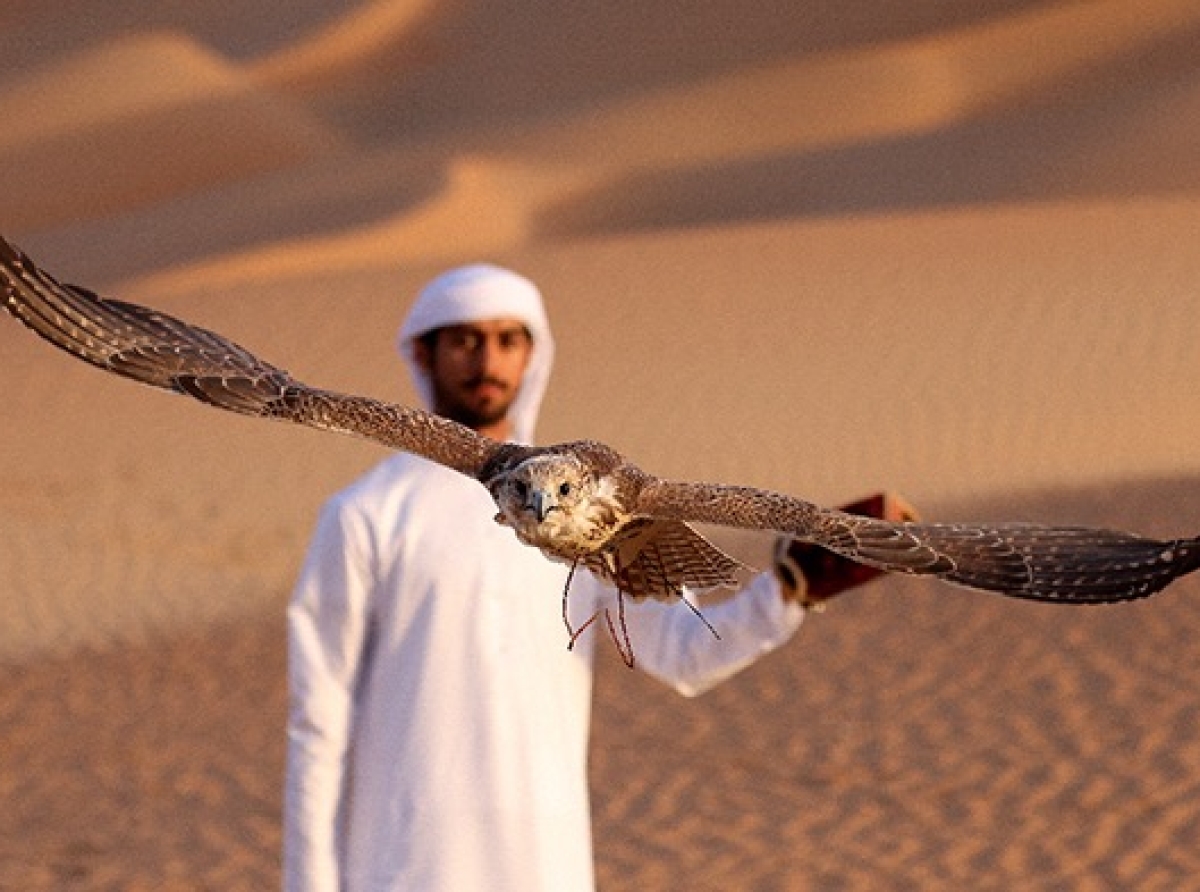Dubai’s Quiet Influence on the Modern Athlete
In the global economy of sport, attention often follows medals and score...
Feb 04, 2026

The ancient art of falconry soars as a vibrant emblem of Emirati heritage. For over 4,000 years, this practice has woven itself into the cultural fabric of the region, evolving from a Bedouin survival tool to a revered sport and symbol of national pride. In Dubai, falconry is more than a tradition; it is a living bridge between past and present, celebrated through training centers, high-stakes competitions, and global recognition as a UNESCO Intangible Cultural Heritage of Humanity since 2016. As the city balances modernity with its Bedouin roots, falconry remains a testament to courage, patience, and a deep connection to nature.
Falconry’s origins in the UAE trace back to the Bedouin tribes who relied on falcons to hunt scarce game like houbara bustards and hares in the unforgiving desert. The falcon, known as the “Saqr,” was prized for its sharp eyesight and speed, capable of diving at over 200 miles per hour to capture prey. Unlike other predators, falcons could be trained to deliver game alive, ensuring it remained halal by Islamic standards, which require animals to be slaughtered while still living. This practical necessity fostered a bond of trust and respect between falconer and bird, a relationship that endures today. “Your falcon is your brother,” says Ayesha Al Mansouri, a female falconer who began training at age four, reflecting the sport’s deep emotional resonance.
Dubai’s commitment to preserving falconry is evident in its world-class facilities and initiatives. The Dubai Falcon Hospital, alongside its larger counterpart in Abu Dhabi, is a global leader in avian care, offering everything from routine checkups to surgical interventions for these prized birds. Equipped with luxurious wards and cutting-edge technology like GPS tracking, the hospital underscores the UAE’s unique dedication—evidenced by its issuance of falcon passports, a world first. Training centers, such as those at Al Marmoom Desert Conservation Reserve, provide hands-on education, teaching traditional techniques alongside modern innovations. Emirati falconers use tools like the “manqalah” (a padded cuff for perching) and “burgu” (a leather hood), while integrating satellite tracking to monitor birds during training. These centers also serve as cultural hubs, hosting workshops to pass skills to younger generations, ensuring the art’s survival.
Competitions are the heartbeat of modern falconry in Dubai, blending spectacle with tradition. The Fazza Championship for Falconry, launched in 2002 by Sheikh Hamdan bin Mohammed bin Rashid Al Maktoum, is a highlight, drawing thousands to its 400-meter desert races where falcons are timed with stopwatches for speed and precision. The Abu Dhabi International Hunting and Equestrian Exhibition (ADIHEX) and Al Dhafra Festival further elevate the sport, featuring not only races but also beauty contests judging falcons on plumage and poise, with prizes reaching thousands of dollars. “These events are about more than competition; they celebrate our identity,” notes a member of the Emirates Falconers’ Club, which organizes many of these gatherings. In 2024, ADIHEX attracted over 150,000 visitors, showcasing falconry’s global appeal.
The falcon’s cultural significance extends beyond the desert. As the UAE’s national emblem, it adorns currency, stamps, and official documents, symbolizing courage, nobility, and resilience. Emirati poetry and songs often depict falcons as loyal companions, while the late Sheikh Zayed bin Sultan Al Nahyan, a lifelong falconer, championed its preservation through initiatives like breeding programs in Al Ain. His 1976 book, Hunting with Falcons, remains a cornerstone of the sport’s literature. Today, falconry is a fixture in national celebrations, with displays at UAE National Day and desert safaris in Dubai, where tourists witness falcons soaring against the sunrise. Platinum Heritage’s in-flight falcon show, conducted from a hot air balloon, offers a unique vantage point, blending tradition with Dubai’s flair for innovation.
Yet, falconry faces challenges in a modernizing world. Urbanization and habitat loss threaten wild falcon populations, prompting conservation efforts like those led by the Emirates Falconers’ Club, which supports breeding and release programs. The UAE’s collaboration with 18 countries to secure UNESCO recognition in 2016 reflects its global leadership in safeguarding this heritage. Women, too, are reshaping the narrative. Falconers like Sheikha Mozah bint Marwan Al Maktoum and Ayesha Al Mansouri are breaking barriers, training alongside men and inspiring a new generation. “Falconry teaches discipline and connection to our roots,” says Sheikha Mozah, who trains daily to strengthen her bond with her birds.
Dubai’s falconry scene is a microcosm of its ethos: a city that honors its past while embracing the future. From the quiet patience of a falconer in the desert to the roar of crowds at the Fazza Championship, this ancient art continues to captivate. As the UAE navigates globalization, falconry remains a soaring reminder of its Bedouin soul, a tradition that, like the falcon itself, refuses to be tamed.
Photo credits: Emirates Falconers’ Club.
Disclosure: Dubai Voice enhances the editing process with the help of carefully selected AI tools. These tools provide valuable support without taking over the editing process completely, ensuring that the final product is the result of human creativity and expertise augmented by the benefits of enhanced technology. This article is protected under the copyright of Dubai Voice. Unauthorized reprinting, republishing, or rewriting of this content is strictly prohibited without explicit permission from Dubai Voice. Quotations from this material are permissible provided that a direct link to the full article on Dubai Voice is included.